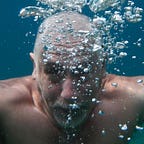Consciousness: natural or supernatural?
I recently read an article on Medium in which Prudence Louise argued that consciousness is fatal to the philosophy of naturalism. Consciousness is supernatural, and the hard problem is the impossible problem because consciousness is not natural.
I was astonished. Consciousness is clearly part of our reality and its existence was famously termed the “the hard problem” by the philosopher David Chalmers. In a previous article, I described how Chalmers set himself the following constraints in tackling the hard problem. First, to take consciousness seriously and not redefine it as something else (as per Daniel Dennett). Second, to take science seriously in the domains where it has authority. Third, to take consciousness to be a natural phenomenon.
Why does Prudence Louise think consciousness must be supernatural? She correctly points out that we have no evidence that consciousness is an emergent property of the brain, though many people, and most neurologists assume it must be. We don’t have any theory of emergence, a proposed mechanism to explain how consciousness could emerge. I agree with her so far.
Prudence Louise then leaps to the opposite conclusion that consciousness is primary and the “material” external world emerges from it: “ nature is just a state of consciousness”. But this idealism has exactly the same problem. We don’t have any theory of emergence, a proposed mechanism which would explain how the material world, with its fundamental fields and particles obeying mathematical laws by whoever or whatever observes them, could emerge from consciousness. We have no evidence that the physical world is an emergent property of consciousness.
But let us grant that it’s a possibility. Consciousness may be fundamental. Why would that then make it supernatural? And what does that mean? What is it makes something supernatural? It can’t be because we have no explanation for emergence. That would just be god of the gaps argument.
I commented on Louise’s article and she replied to say that “supernatural means beyond nature, so it’s meaning depends on the definition of natural. If there is no precise definition of the word natural, then saying consciousness is natural is meaningless. I agree and the Stanford Dictionary of Philosophy’s article on naturalism says that:
The term “naturalism” has no very precise meaning in contemporary philosophy. …… It would be fruitless to try to adjudicate some official way of understanding the term. Different contemporary philosophers interpret “naturalism” differently.
Since supernatural = not natural, that of course means that saying consciousness is supernatural is also meaningless per se. Prudence Louise defines natural as physical (or supervening on the physical). The fact that consciousness does not supervene on the physical is in fact her reason for concluding that consciousness is supernatural. But this is purely a definitional issue. I define natural to include consciousness and other things that are real but may not supervene on the physical. But have I just slipped the definitional issue onto the concept of “real”.
Perhaps I could reframe my definition of naturalism as concerned with the idea that only natural laws and forces operate in the universe. Nature cannot just be equated with what is referenced by the totality of our current scientific knowledge, and things that supervene on it. We know that our current knowledge is incomplete and will change in future. So until we have evidence otherwise, we are entitled to treat consciousness as a natural thing which will be subject to as yet unknown laws and forces. We cannot just say because we don’t know how consciousness arises or works that therefore it is supernatural.
So what does supernatural refer to? I take it to refer to something not subject to natural laws or forces, that operates in ways that are in principle not bound by any laws or principles, in other words, magical. If it exists, it has to exist outside reality. If the supernatural were to interact with reality, it would cease to become supernatural and instead become natural. Thus if we were to actually get convincing evidence of ghosts, that we could interact with and experiment with, they would be classified as real and natural.
The supernatural is thus indistinguishable from the non-existent. Consciousness exists, it is not an illusion, and is natural. The hard problem remains unresolved. We don’t know how consciousness arises. It may indeed turn out to be emergent from the physical, or it may be a basic property of the physical, along with charge, spin etc, or indeed it may be the fundamental natural field from which everything else emerges. Under any of these hypotheses it remains natural.
I like to think of the physical as the outside of reality and consciousness as the inside. The inside and outside go together.
